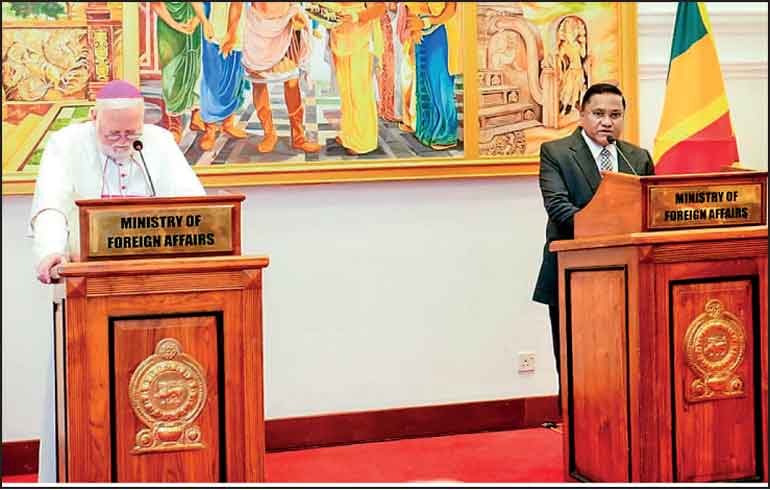Saturday Feb 21, 2026
Saturday Feb 21, 2026
Friday, 14 November 2025 00:00 - - {{hitsCtrl.values.hits}}

Archbishop Paul Richard Gallagher (left) with Foreign Affairs Minister Vijitha Herath at a joint press briefing in Colombo
Sri Lanka yesterday invited Pope Leo XIV to visit the country as part of commemorations marking 50 years of diplomatic relations with the Holy See, the Foreign Affairs Ministry said.
The invitation was extended during the five-day official visit of Archbishop Paul Richard Gallagher, the Holy See’s Secretary for Relations with States and International Organisations, who concluded his stay on 8 November. His visit highlighted the growing engagement between the two states and the shared interest in peace, reconciliation and interfaith cooperation.
Archbishop Gallagher met President Anura Kumara Dissanayaka and Prime Minister Dr. Harini Amarasuriya, with both leaders expressing appreciation for the Vatican’s support in education and social development. They also reaffirmed the Government’s commitment to advancing reconciliation through dialogue and inclusion. Gallagher welcomed Sri Lanka’s progress and conveyed the Holy See’s continued solidarity with its people.
He also held bilateral discussions with Foreign Affairs Minister Vijitha Herath on cooperation in humanitarian work through Caritas Sri Lanka–SEDEC, as well as initiatives to strengthen interfaith harmony. The two sides discussed joint efforts to counter drug trafficking, terrorism and extremism, while identifying scope for collaboration in environmental and social-justice initiatives.
At a joint media briefing, both parties reiterated their commitment to human dignity, peace and global cooperation. During his visit, Archbishop Gallagher delivered a public lecture in Colombo titled “Working Together for Dialogue and Peace: The Perspective and Commitment of the Holy See,” marking the 50th anniversary of diplomatic ties. The event was attended by government officials, diplomats and clergy.
The series of engagements reinforced the trajectory of Sri Lanka–Holy See relations and set the stage for deeper cooperation in peace-building, education and the promotion of religious coexistence.